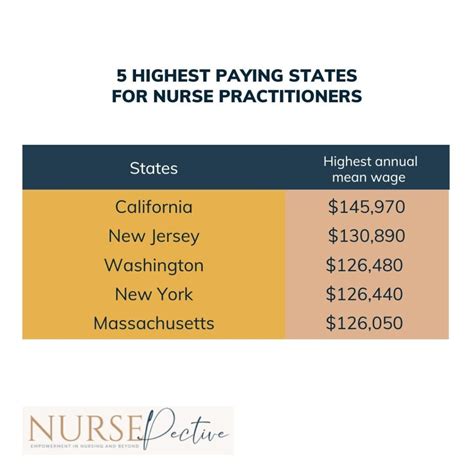Intro
Nurse practitioners (NPs) play a vital role in the healthcare system, providing high-quality patient care and serving as primary and specialty care providers. With the increasing demand for healthcare services, the job outlook for NPs is promising, with the Bureau of Labor Statistics predicting a 52% employment growth rate from 2020 to 2030. As NPs continue to expand their scope of practice and take on more responsibilities, their salaries are also increasing. In this article, we will explore the top 5 nurse practitioner salaries by specialty, highlighting the average salary ranges, growth opportunities, and required education and certifications.

Top 5 Nurse Practitioner Salaries by Specialty
Based on national averages and online sources, such as the Bureau of Labor Statistics, Medscape, and the American Association of Nurse Practitioners, here are the top 5 nurse practitioner salaries by specialty:
1. Neonatal Nurse Practitioner (NNP)
Average salary range: $125,000 - $170,000 per year
Neonatal nurse practitioners specialize in the care of newborns, particularly those who are critically ill or premature. NNPs work in neonatal intensive care units (NICUs) and are responsible for assessing, diagnosing, and treating newborns. To become an NNP, one must earn a Master's or Doctoral degree in nursing and obtain certification from the National Certification Corporation (NCC).

2. Pediatric Nurse Practitioner (PNP)
Average salary range: $115,000 - $160,000 per year
Pediatric nurse practitioners specialize in the care of infants, children, and adolescents. PNPs work in pediatric clinics, hospitals, and private practices, providing primary and specialty care to children. To become a PNP, one must earn a Master's or Doctoral degree in nursing and obtain certification from the Pediatric Nursing Certification Board (PNCB).
3. Family Nurse Practitioner (FNP)
Average salary range: $105,000 - $150,000 per year
Family nurse practitioners provide primary and specialty care to individuals across the lifespan, from children to adults. FNPs work in family medicine clinics, hospitals, and private practices, diagnosing and treating patients with various health conditions. To become an FNP, one must earn a Master's or Doctoral degree in nursing and obtain certification from the American Association of Nurse Practitioners (AANP) or the American Nurses Credentialing Center (ANCC).

4. Gerontological Nurse Practitioner (GNP)
Average salary range: $100,000 - $145,000 per year
Gerontological nurse practitioners specialize in the care of older adults, providing primary and specialty care to patients with age-related health conditions. GNPs work in geriatric clinics, hospitals, and long-term care facilities, assessing and treating patients with various health needs. To become a GNP, one must earn a Master's or Doctoral degree in nursing and obtain certification from the American Association of Nurse Practitioners (AANP) or the American Nurses Credentialing Center (ANCC).
5. Acute Care Nurse Practitioner (ACNP)
Average salary range: $95,000 - $140,000 per year
Acute care nurse practitioners specialize in the care of critically ill patients, providing high-intensity care in hospitals and intensive care units. ACNPs work with patients who have complex health conditions, such as cardiovascular or respiratory disease. To become an ACNP, one must earn a Master's or Doctoral degree in nursing and obtain certification from the American Association of Critical-Care Nurses (AACN).

Factors Affecting Nurse Practitioner Salaries
Several factors can influence nurse practitioner salaries, including:
- Location: Salaries can vary significantly depending on the location, with urban areas tend to offer higher salaries than rural areas.
- Experience: More experienced NPs tend to earn higher salaries, with some employers offering higher salaries for NPs with 2-5 years of experience.
- Education: NPs with advanced degrees, such as Doctoral degrees, may earn higher salaries than those with Master's degrees.
- Certification: Certification in a specific specialty can also impact salary, with some employers offering higher salaries for certified NPs.
- Employment setting: NPs working in hospitals or private practices may earn higher salaries than those working in clinics or community health organizations.
Conclusion
Nurse practitioners play a vital role in the healthcare system, providing high-quality patient care and serving as primary and specialty care providers. With the increasing demand for healthcare services, the job outlook for NPs is promising, with salaries increasing accordingly. By understanding the top 5 nurse practitioner salaries by specialty and the factors that influence salaries, NPs can make informed decisions about their careers and negotiate salaries that reflect their education, experience, and certifications.
We invite you to share your thoughts and experiences as a nurse practitioner in the comments section below. What specialty do you work in, and what is your average salary range? Do you have any tips for negotiating salaries or advancing your career as an NP?
What is the average salary range for nurse practitioners in the United States?
+The average salary range for nurse practitioners in the United States is between $90,000 and $140,000 per year, depending on the specialty and location.
What is the highest-paying nurse practitioner specialty?
+Neonatal nurse practitioner (NNP) is currently the highest-paying nurse practitioner specialty, with an average salary range of $125,000 to $170,000 per year.
What factors can influence nurse practitioner salaries?
+Factors that can influence nurse practitioner salaries include location, experience, education, certification, and employment setting.
